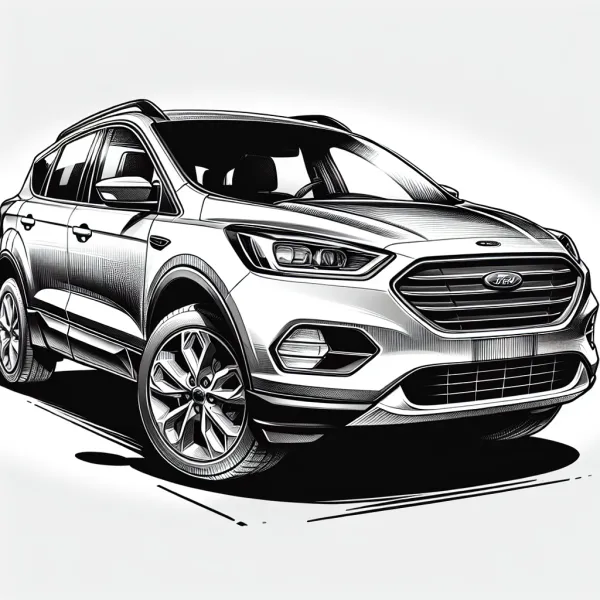Ford Escape/Kuga 1.5L EcoBoost: A Mechanic's Unfiltered Review
Ford Escape/Kuga 1.5L EcoBoost: A Mechanic's Unfiltered Review
So, you're thinking about buying a Ford Escape/Kuga with the 1.5L EcoBoost engine? Let's cut through the marketing fluff. I'm a mechanic, and I've seen it all. This article is for folks who want the straight truth, warts and all, about these vehicles, specifically the post-2020 models. This engine is generally suited for city driving and those wanting decent fuel economy without the need for serious towing or off-roading. Don't expect miracles; this isn't a performance engine.
Real-World Fuel Consumption
The official EPA numbers? Forget 'em. In the real world, I've seen anywhere from 25 to 32 MPG, depending on driving style, terrain, and how much lead you're in your foot. Aggressive driving? Expect the lower end of that range. Mostly highway miles, gentle acceleration? You might hit the higher numbers. The engine's direct injection can be sensitive to fuel quality, so premium fuel can help, but it's not a night-and-day difference.
Common Problems (From a Mechanic's Perspective)
Let's get to the nitty-gritty. These 1.5L EcoBoosts aren't exactly trouble-free. I've seen a fair share of issues, including:
- Turbocharger problems: These are common on smaller turbocharged engines. Lack of regular maintenance and poor driving habits (short trips, hard acceleration) can lead to turbo failure, a costly repair.
- Timing chain issues: While not as common as some other engines, I have seen premature wear on the timing chain in some instances. It's often related to a lack of oil changes and using improper oil.
- Fuel injector problems: Direct injection systems are prone to clogging, leading to rough running, misfires, and reduced fuel economy. Again, fuel quality and maintenance play a significant role.
- Electrical gremlins: Like many modern cars, these Escapes have a plethora of electronic controls. Sensor failures and wiring harness issues can be time-consuming and expensive to diagnose and fix.
Maintenance Costs
Oil changes are relatively inexpensive, but using the correct synthetic oil is crucial (check your owner's manual). Brake jobs are standard fare. Tires depend on your driving habits and the type of tires you choose. The timing chain is the big one: replacement is a major repair. Expect to pay a premium for parts and labor on these newer vehicles.
Hidden Costs
Special tools are sometimes needed for certain repairs on this engine. Dealerships frequently have these, independent shops may not. The cost of these tools can be added to your repair bill. Remember the correct oil, and you should be good to go.
Overall Reliability
Frankly, reliability is a mixed bag. If meticulously maintained and driven properly, they can be reasonably dependable. But neglect them, and you'll be paying the price. Compared to some older, simpler engines, they are more complex and prone to issues related to the turbocharger and direct injection systems. I'd say it's average, at best, for reliability.
Total Cost of Ownership
This is where it gets tricky. While the initial purchase price might be reasonable, factor in fuel costs (not great, but not terrible), maintenance, potential repairs (and those turbocharger repairs can be nasty), insurance, and taxes. It's not a cheap car to own long-term, especially compared to some less technologically advanced models.
Resale Value
Resale value is decent, but not stellar. Ford Escapes generally hold their value reasonably well, but the 1.5L EcoBoost may depreciate slightly more than some other engine options due to the potential for higher repair costs. The resale market is competitive, so don't expect to get top dollar unless the vehicle is in pristine condition with a complete service history.
Tips for Prospective Buyers
For used models, get a pre-purchase inspection from a trusted mechanic (not the dealership!). Check the service records meticulously. Look for signs of turbocharger problems (unusual noises, reduced power), and be wary of any modifications or aftermarket parts. Walk away from any car with a sketchy history or major unresolved issues. Never assume a low price means a good deal.
Alternatives
Depending on your needs and budget, consider a used Honda CR-V or Toyota RAV4. They might not have the same features, but they generally boast superior reliability and lower long-term ownership costs. If you need more space, a Mazda CX-5 could be a good option.
Conclusion
The Ford Escape/Kuga 1.5L EcoBoost is a decent enough compact SUV, but it's not without its drawbacks. The fuel economy is okay, but the potential for costly repairs is a serious consideration. If you're looking for a reliable, low-maintenance vehicle, this might not be your best bet. Unless you're meticulous with maintenance, and you can afford the potential repair costs, I'd advise looking elsewhere.
